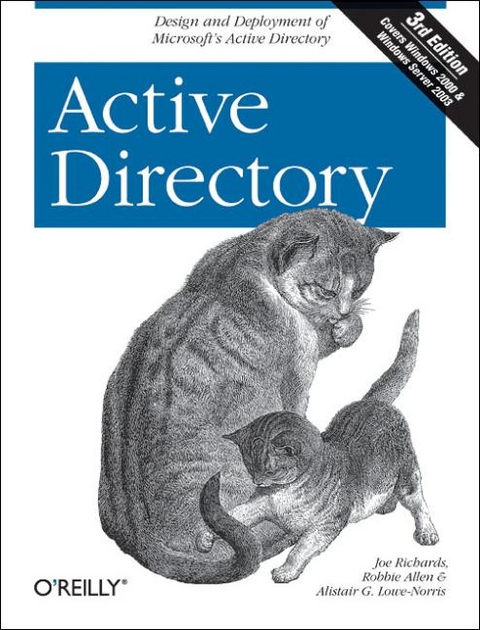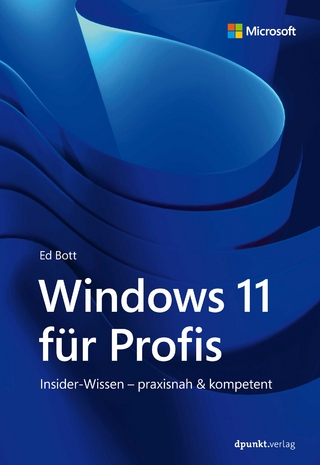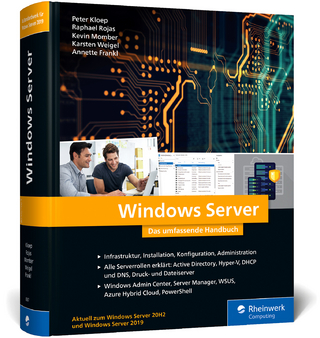
Active Directory
O'Reilly Media (Verlag)
978-0-596-10173-2 (ISBN)
- Titel ist leider vergriffen;
keine Neuauflage - Artikel merken
Working with Microsoft's network directory service for the first time can be a headache for system and network administrators, IT professionals, technical project managers, and programmers alike. This authoritative guide is meant to relieve that pain. Instead of going through the graphical user interface screen by screen, O'Reilly's bestselling "Active Directory" tells you how to design, manage, and maintain a small, medium, or enterprise Active Directory infrastructure. Fully updated to cover Active Directory for Windows Server 2003 SP1 and R2, this third edition is full of important updates and corrections. It's perfect for all Active Directory administrators, whether you manage a single server or a global multinational with thousands of servers. "Active Directory, 3rd Edition" is divided into three parts. Part I introduces much of how Active Directory works, giving you a thorough grounding in its concepts. Some of the topics include Active Directory replication, the schema, application partitions, group policies, and interaction with DNS. Part II details the issues around properly designing the directory infrastructure.
Topics include designing the namespace, creating a site topology, designing group policies for locking down client settings, auditing, permissions, backup and recovery, and a look at Microsoft's future direction with Directory Services. Part III covers how to create and manipulate users, groups, printers, and other objects that you may need in your everyday management of Active Directory. If you want a book that lays bare the design and management of an enterprise or departmental Active Directory, then look no further. Active Directory, 3rd Edition will quickly earn its place among the books you don't want to be without.
Robbie Allen is a technical leader at Cisco Systems, where he has been involved in the deployment of Active Directory, DNS, DHCP, and several network management solutions. He enjoys working on Unix and Windows, and his favorite programming language is Perl. Robbie was named a Windows Server MVP in 2004 and 2005 for his contributions to the Windows community and the publication of several popular O'Reilly books. Robbie is currently studying at MIT in its system design and management program. For more information, see Robbie's web site at www.rallenhome.com. Alistair G. Lowe-Norris is an Architectural Enterprise Strategy Consultant for Microsoft UK. During the writing of the first version of this book he worked for Leicester University as the project manager and technical lead of the Rapid Deployment Program for Windows 2000. During his time there, Leicester was part of Microsoft's U.K. and U.S. Rapid Deployment Programs for Windows 2000, and was responsible for rolling out what turned out to be one of the world's largest deployments of Windows 2000 preceding release of the final product. Since 1998 he has been the technical editor and a monthly columnist for the Windows Scripting Solutions magazine and a technical editor and author for Windows & .Net Magazine (previously Windows NT Magazine and Windows 2000 Magazine). In addition he is an author and editor for various other publications and online sites worldwide. He holds various Microsoft and other accreditations and has been using Windows 2000 and its descendents daily since October 1997. He lives in Leicester, UK.
Preface Part I. Active Directory Basics 1. A Brief Introduction Evolution of the Microsoft NOS Windows NT Versus Active Directory Windows 2000 Versus Windows Server 2003 Windows Server 2003 Versus Windows Server 2003 R2 Summary 2. Active Directory Fundamentals How Objects Are Stored and Identified Building Blocks Summary 3. Naming Contexts and Application Partitions Domain Naming Context Configuration Naming Context Schema Naming Context Application Partitions Summary 4. Active Directory Schema Structure of the Schema Attributes (attributeSchema Objects) Attribute Properties Classes (classSchema Objects) Summary 5. Site Topology and Replication Site Topology Data Replication Summary 6. Active Directory and DNS DNS Fundamentals DC Locator Resource Records Used by Active Directory Delegation Options Active Directory Integrated DNS Using Application Partitions for DNS Summary 7. Profiles and Group Policy Primer A Profile Primer Capabilities of GPOs Additional Resources Summary Part II. Designing an Active Directory Infrastructure 8. Designing the Namespace The Complexities of a Design Where to Start Overview of the Design Process Domain Namespace Design Design of the Internal Domain Structure Other Design Considerations Design Examples Designing for the Real World Summary 9. Creating a Site Topology Intrasite and Intersite Topologies Designing Sites and Links for Replication Examples Additional Resources Summary 10. Designing Organization-Wide Group Policies How GPOs Work Managing Group Policies Using GPOs to Help Design the Organizational Unit Structure Debugging Group Policies Summary 11. Active Directory Security: Permissions and Auditing Permission Basics Using the GUI to Examine Permissions Using the GUI to Examine Auditing Designing Permission Schemes Designing Auditing Schemes Real-World Examples Summary 12. Designing and Implementing Schema Extensions Nominating Responsible People in Your Organization Thinking of Changing the Schema Creating Schema Extensions Summary 13. Backup, Recovery, and Maintenance Backing Up Active Directory Restoring a Domain Controller Restoring Active Directory FSMO Recovery DIT Maintenance Summary 14. Upgrading to Windows Server 2003 New Features in Windows Server 2003 Differences with Windows 2000 Functional Levels Explained Preparing for ADPrep Upgrade Process Post-Upgrade Tasks Summary 15. Upgrading to Windows Server 2003 R2 New Active Directory Features in Windows Server 2003 Service Pack 1 Differences with Windows Server 2003 New Active Directory Features in Windows Server 2003 R2 Preparing for ADPrep Service Pack 1 Upgrade Process R2 Upgrade Process Summary 16. Migrating from Windows NT The Principles of Upgrading Windows NT Domains Summary 17. Integrating Microsoft Exchange A Quick Word About Exchange/AD Interaction Preparing Active Directory for Exchange Exchange 5.5 and the Active Directory Connector Summary 18. Active Directory Application Mode (ADAM) ADAM Terms Differences Between AD and ADAM V1.0 ADAM R2 Updates ADAM R2 Installation Tools ADAM Schema Using ADAM Summary 19. Interoperability, Integration, and Future Direction Microsoft's Directory Strategy Interoperating with Other Directories Integrating Applications and Services Summary Part III. Scripting Active Directory with ADSI, ADO, and WMI 20. Scripting with ADSI What Are All These Buzzwords? Writing and Running Scripts ADSI Simple Manipulation of ADSI Objects Further Information Summary 21. IADs and the Property Cache The IADs Properties Manipulating the Property Cache Checking for Errors in VBScript Summary 22. Using ADO for Searching The First Search Other Ways of Connecting and Retrieving Results Understanding Search Filters Optimizing Searches Advanced Search Function: SearchAD Summary 23. Users and Groups Creating a Simple User Account Creating a Full-Featured User Account Creating Many User Accounts Modifying Many User Accounts Account Unlocker Utility Creating a Group Adding Members to a Group Evaluating Group Membership Summary 24. Basic Exchange Tasks Notes on Managing Exchange Exchange Management Tools Mail-Enabling Versus Mailbox-Enabling Exchange Delegation Mail-Enabling a User Mail-Disabling a User Creating and Mail-Enabling a Contact Mail-Disabling a Contact Mail-Enabling a Group (Distribution List) Mail-Disabling a Group Mailbox-Enabling a User Mailbox-Disabling a User (Mailbox Deletion) Purging a Disconnected Mailbox Reconnecting a Disconnected Mailbox Moving a Mailbox Enumerating Disconnected Mailboxes Viewing Mailbox Sizes and Message Counts Viewing All Store Details of All Mailboxes on a Server Dumping All Store Details of All Mailboxes on All Servers in Exchange Org Summary 25. Shares and Print Queues The Interface Methods and Properties Creating and Manipulating Shares with ADSI Enumerating Sessions and Resources Manipulating Print Queues and Print Jobs Summary 26. Permissions and Auditing How to Create an ACE Using ADSI A Simple ADSI Example A Complex ADSI Example Creating Security Descriptors Listing the Security Descriptor of an Object Summary 27. Extending the Schema and the Active Directory Snap-ins Modifying the Schema with ADSI Customizing the Active Directory Administrative Snap-ins Summary 28. Using ADSI and ADO from ASP or VB VBScript Limitations and Solutions How to Avoid Problems When Using ADSI and ASP Combining VBScript and HTML Binding to Objects via Authentication Incorporating Searches into ASP Migrating Your ADSI Scripts from VBScript to VB Summary 29. Scripting with WMI Origins of WMI WMI Architecture Getting Started with WMI Scripting WMI Tools Manipulating Services Querying the Event Logs Querying AD with WMI Monitoring Trusts Monitoring Replication Summary 30. Manipulating DNS DNS Provider Overview Manipulating DNS Server Configuration Creating and Manipulating Zones Creating and Manipulating Resource Records Summary31. Getting Started with VB.NET and System.Directory Services The .NET Framework Using VB.NET Overview of System.DirectoryServices DirectoryEntry Basics Searching with DirectorySearcher Manipulating Objects Summary Index
| Erscheint lt. Verlag | 28.2.2006 |
|---|---|
| Zusatzinfo | Illustrations |
| Verlagsort | Sebastopol |
| Sprache | englisch |
| Maße | 178 x 232 mm |
| Einbandart | kartoniert |
| Themenwelt | Informatik ► Betriebssysteme / Server ► Windows |
| ISBN-10 | 0-596-10173-2 / 0596101732 |
| ISBN-13 | 978-0-596-10173-2 / 9780596101732 |
| Zustand | Neuware |
| Informationen gemäß Produktsicherheitsverordnung (GPSR) | |
| Haben Sie eine Frage zum Produkt? |
aus dem Bereich


